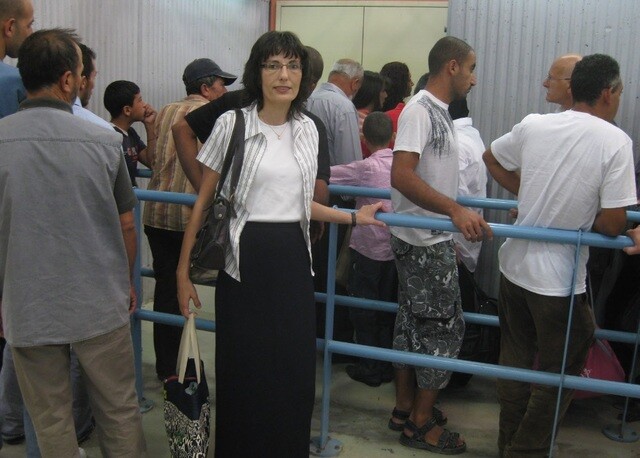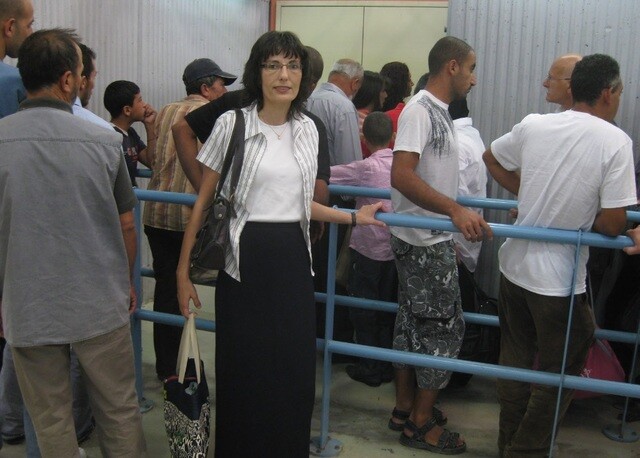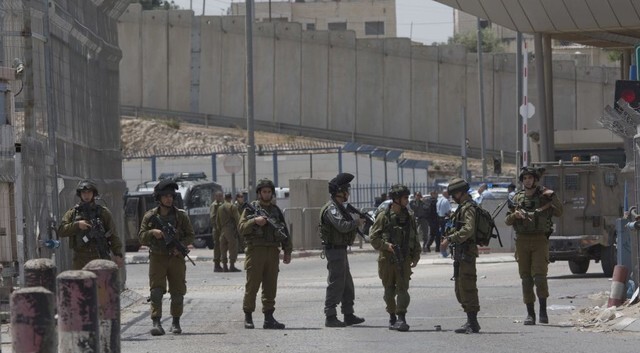Sahar Qumsiyeh, a Palestinian born in Jerusalem, often faced extreme difficulties attending LDS sacrament meetings in Jerusalem, the closest services to her home in Bethlehem. Facing checkpoints, blocked roads, the possibility of arrest, and even Israeli soldiers shooting at her on numerous occasions, Qumsiyeh continued to press forward in order to partake of the sacrament on a regular basis. The following is an excerpt from her story, Peace for a Palestinian: One Woman's Story of Faith Amidst War in the Holy Land.
I have often considered myself to be a person of strong faith. I feel that my faith has allowed me to witness many miracles in my life. I have been protected, and I have been able to make it to church many times despite the checkpoints, curfews, and hardships. An old Muslim woman, however, once taught me a lesson about faith that helped me realize that my own faith was still small.
I met her one day while traveling to church. We were both stopped at a checkpoint, and everyone else in the taxi van had a permit to enter Jerusalem—everyone except for this elderly Muslim woman and me. The soldiers quickly identified the two of us and commanded us to get out of the taxi and return the way we had come. Trying to be helpful, the taxi driver advised us to cross the street and try to pass through at the other side of the checkpoint. Personally, I did not think it was a smart idea for many reasons. For one, the road was only about forty feet wide, so it was almost impossible not to be noticed. And there were eight soldiers stationed at the checkpoint, all of whom certainly saw us being kicked out of the taxi. So how would they allow us to cross?

Sahar waiting in a line to cross the checkpoint into Jerusalem—a process that could take hours.
The Muslim woman looked at me with her black eyes and said, “Let us try.” I looked at her face. It was covered with wrinkles, and her gray hair showed slightly from underneath her white veil. Despite her age, I could tell she was a strong woman. Reluctantly, I followed this insistent old woman, mainly so I could prove that what we were about to do was pointless. While walking to the other side of the road, I heard this sweet woman repeat the words: “God, please distract the soldiers so we can pass.” Although I was amazed at her faith, I could not imagine how this would work. We calmly walked to the other side of the road and began crossing through the checkpoint roadblocks only a few feet away from the soldiers who had just denied us entry. As I continued walking, I anticipated a yell from one of the soldiers at any moment, commanding us to turn back. We kept walking and walking . . . silence. No one noticed us. No one stopped us. Thanks to the faith of one remarkable Muslim woman who trusted that God could distract eight soldiers, I succeeded in my quest to worship Jesus Christ at my church with my fellow members that day.
► You'll also like: After Asking God to End Her Life, This Palestinian Found Peace in the Gospel
This sweet woman taught me about true faith. She taught me that even when something seems impossible, you should still believe it can happen. The Savior tells us, “If ye have faith as a grain of mustard seed, ye shall say unto this mountain, Remove hence to yonder place; and it shall remove; and nothing shall be impossible unto you” (Matthew 17:20).
However, later in my life I discovered that faith does not mean that you always get what you want or even what you need. Sometimes faith means accepting the will of the Lord, because it is always better than our own will and desire. When my brother-in-law Hazim was diagnosed with cancer at the young age of fifty-three in 2010, I followed the example of the Muslim woman and prayed that he would be healed. I knew that it would require a miracle for Hazim to be healed, but I had been taught to believe in miracles. I felt that I had the necessary faith and that if I prayed hard enough, Hazim would be healed. I thought that my small faith, even though not strong enough to remove mountains, would be strong enough to heal a sick person. As I prayed and pleaded with the Lord with all my heart, the Lord told me that Hazim would die and that his death would strengthen my sister and her four children. Heavenly Father was saying no to my request for a miracle. He was telling me that this particular mountain was not meant to be removed.
Sometimes our mountains are not removed. It may be the wisdom of God that we climb those mountains and pass through those rocky, difficult roads. The faith needed to climb our mountains is actually greater than the faith needed to remove them. I often had to climb hills, mountains, and walls in order to get to church. My faith did not enable me to remove those obstacles or trials from my path. But Heavenly Father has given me the courage and strength to pass through them. Because I have done so, my faith has grown stronger.
As the Savior walked on the water and approached His disciples in the boat on the Sea of Galilee, He said to them, “Be of good cheer; it is I; be not afraid” (Matthew 14:27). The Lord bid Peter to come to Him, and Peter walked on the water toward the Savior: “But when he saw the wind boisterous, he was afraid; and beginning to sink, he cried, saying, Lord, save me. And immediately Jesus stretched forth his hand, and caught him, and said unto him, O thou of little faith, wherefore didst thou doubt?” (Matthew 14:30–31). Peter was an ordinary man, yet the Lord enabled him to do an extraordinary thing: to walk on water. Peter started to sink because of the storm that surrounded him. Many of us often lose our faith when we are faced with the storms of adversity. However, you will notice that when Peter feared, the Savior did not stop the winds, the waves, and the storm. Instead He reached out His hand and pulled Peter up. He does the same for us in our lives. He often does not calm the storms around us, but He gives us strength to go through them. He stretches forth His mighty arm and lifts us, bidding us not to doubt. Until I heard this experience related by my friend Camille, I had never noticed the next verse. Verse 32 says, “And when they were come into the ship, the wind ceased.” When we allow the Savior into our lives, we feel peace and comfort and strength.
I know that difficult things are placed in our path for a reason. As we face mountains in our path, may we remember that these mountains are there to strengthen us and fortify our faith as we climb them with the Lord by our side. His work and His glory is to bring to pass our salvation. Nothing He does and nothing He allows to happen will harm us permanently. All our difficulties and hardships are there to strengthen us, refine us, and make us more like our Father in Heaven. When we face our daily mountains, may we not wish for them to be gone but pray for courage, strength, and faith to climb them.
Lead image from The Times of Israel
Get more insights from Peace for a Palestinian: One Woman's Story of Faith Amidst War in the Holy Land.
Sahar Qumsiyeh was born into a loving Christian family in Jerusalem and raised in Beit Sahour, near Bethlehem. Growing up in a country torn apart by political upheaval, Sahar struggled with feelings of hopelessness and anger as she watched her people being persecuted, tormented, and even killed.
As a young adult, Sahar received a scholarship to an American university. While there, she was baptized into The Church of Jesus Christ of Latter-day Saints. But staying true to her new faith was put to the test when Sahar returned home to Palestine.
In Peace for a Palestinian, Sahar shares her experience desperately searching for peace and joy only to find that true peace lies not in external resolution but in following the Savior. As she explains, "We may live in a place with barriers, checkpoints, and restrictions, but we can feel liberated by His Atonement."




